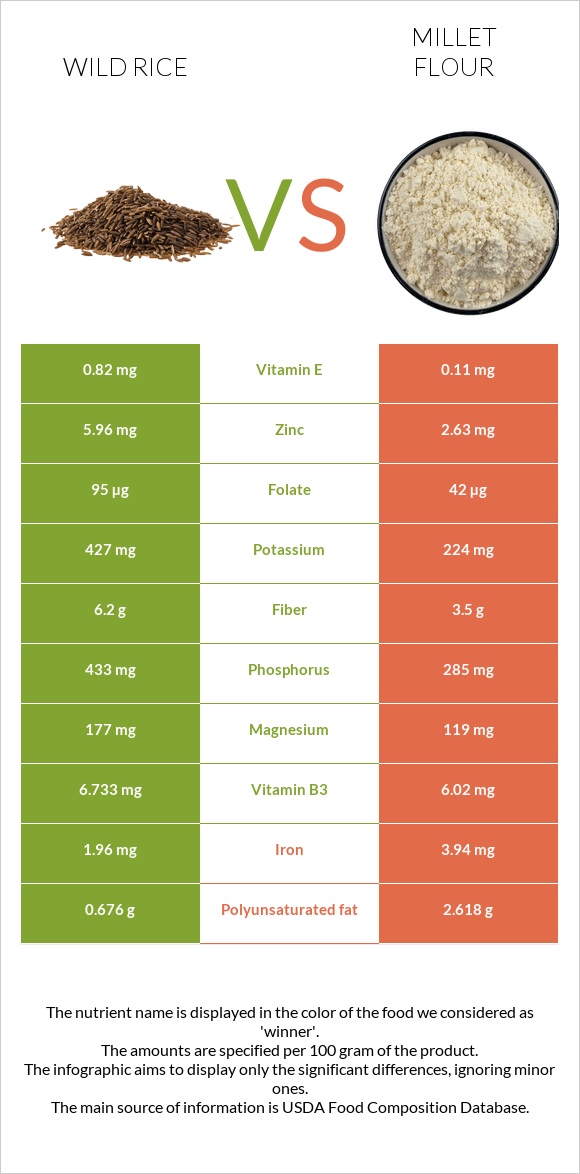Wild rice vs. Millet flour — In-Depth Nutrition Comparison
Compare
What are the main differences between wild rice and millet flour?
- Millet flour has more selenium, copper, iron, manganese, vitamin B1, vitamin B3, phosphorus, vitamin B5, magnesium, and vitamin B6 than wild rice.
- Millet flour's daily need coverage for selenium is 58% higher.
- Millet flour has a higher glycemic index (70) than wild rice (57).
We used Wild rice, cooked and Millet flour types in this comparison.
Infographic

Infographic link
Mineral Comparison
Mineral comparison score is based on the number of minerals by which one or the other food is richer. The "coverage" charts below show how much of the daily needs can be covered by 300 grams of the food.
| Contains less SodiumSodium | -25% |
| Contains more MagnesiumMagnesium | +271.9% |
| Contains more CalciumCalcium | +366.7% |
| Contains more PotassiumPotassium | +121.8% |
| Contains more IronIron | +556.7% |
| Contains more CopperCopper | +342.1% |
| Contains more ZincZinc | +96.3% |
| Contains more PhosphorusPhosphorus | +247.6% |
| Contains more ManganeseManganese | +255.3% |
| Contains more SeleniumSelenium | +3987.5% |
Vitamin Comparison
Vitamin comparison score is based on the number of vitamins by which one or the other food is richer. The "coverage" charts below show how much of the daily needs can be covered by 300 grams of the food.
| Contains more Vitamin EVitamin E | +118.2% |
| Contains more Vitamin B2Vitamin B2 | +19.2% |
| Contains more Vitamin B1Vitamin B1 | +694.2% |
| Contains more Vitamin B3Vitamin B3 | +367.8% |
| Contains more Vitamin B5Vitamin B5 | +722.7% |
| Contains more Vitamin B6Vitamin B6 | +175.6% |
| Contains more Vitamin KVitamin K | +60% |
| Contains more FolateFolate | +61.5% |
All nutrients comparison - raw data values
| Nutrient |  |
 |
DV% diff. |
| Selenium | 0.8µg | 32.7µg | 58% |
| Copper | 0.121mg | 0.535mg | 46% |
| Iron | 0.6mg | 3.94mg | 42% |
| Manganese | 0.282mg | 1.002mg | 31% |
| Vitamin B1 | 0.052mg | 0.413mg | 30% |
| Vitamin B3 | 1.287mg | 6.02mg | 30% |
| Starch | 69.88g | 29% | |
| Phosphorus | 82mg | 285mg | 29% |
| Vitamin B5 | 0.154mg | 1.267mg | 22% |
| Magnesium | 32mg | 119mg | 21% |
| Carbs | 21.34g | 75.12g | 18% |
| Vitamin B6 | 0.135mg | 0.372mg | 18% |
| Polyunsaturated fat | 0.213g | 2.618g | 16% |
| Calories | 101kcal | 382kcal | 14% |
| Protein | 3.99g | 10.75g | 14% |
| Zinc | 1.34mg | 2.63mg | 12% |
| Fiber | 1.8g | 3.5g | 7% |
| Fats | 0.34g | 4.25g | 6% |
| Potassium | 101mg | 224mg | 4% |
| Folate | 26µg | 42µg | 4% |
| Choline | 10.2mg | 2% | |
| Saturated fat | 0.049g | 0.536g | 2% |
| Monounsaturated fat | 0.05g | 0.924g | 2% |
| Calcium | 3mg | 14mg | 1% |
| Vitamin E | 0.24mg | 0.11mg | 1% |
| Vitamin B2 | 0.087mg | 0.073mg | 1% |
| Protein per 100 calories | 3.9504950495049505g | 2.8141361256544504g | N/A |
| Calories per 10 g protein | 253.1328320802005kcal | 355.3488372093023kcal | N/A |
| Net carbs | 19.54g | 71.62g | N/A |
| Sugar | 0.73g | 1.66g | N/A |
| Sodium | 3mg | 4mg | 0% |
| Vitamin K | 0.5µg | 0.8µg | 0% |
| Trans fat | 0.002g | N/A | |
| Tryptophan | 0.049mg | 0.17mg | 0% |
| Threonine | 0.127mg | 0.354mg | 0% |
| Isoleucine | 0.167mg | 0.473mg | 0% |
| Leucine | 0.276mg | 1.537mg | 0% |
| Lysine | 0.17mg | 0.144mg | 0% |
| Methionine | 0.119mg | 0.319mg | 0% |
| Phenylalanine | 0.195mg | 0.675mg | 0% |
| Valine | 0.232mg | 0.584mg | 0% |
| Histidine | 0.104mg | 0.257mg | 0% |
| Fructose | 0.2g | 0g | 0% |
| Omega-3 - ALA | 0.044g | N/A | |
| Omega-6 - Eicosadienoic acid | 0.002g | N/A | |
| Omega-6 - Linoleic acid | 2.549g | N/A |
Macronutrient Comparison
Macronutrient breakdown side-by-side comparison
Protein:
3.99 g
Fats:
0.34 g
Carbs:
21.34 g
Water:
73.93 g
Other:
0.4 g
Protein:
10.75 g
Fats:
4.25 g
Carbs:
75.12 g
Water:
8.67 g
Other:
1.21 g
| Contains more WaterWater | +752.7% |
| Contains more ProteinProtein | +169.4% |
| Contains more FatsFats | +1150% |
| Contains more CarbsCarbs | +252% |
| Contains more OtherOther | +202.5% |
Fat Type Comparison
Fat type breakdown side-by-side comparison
Saturated fat:
Sat. Fat
0.049 g
Monounsaturated fat:
Mono. Fat
0.05 g
Polyunsaturated fat:
Poly. Fat
0.213 g
Saturated fat:
Sat. Fat
0.536 g
Monounsaturated fat:
Mono. Fat
0.924 g
Polyunsaturated fat:
Poly. Fat
2.618 g
| Contains less Sat. FatSaturated fat | -90.9% |
| Contains more Mono. FatMonounsaturated fat | +1748% |
| Contains more Poly. FatPolyunsaturated fat | +1129.1% |
Carbohydrate type comparison
Carbohydrate type breakdown side-by-side comparison
Starch:
0 g
Sucrose:
0.33 g
Glucose:
0.2 g
Fructose:
0.2 g
Lactose:
0 g
Maltose:
0 g
Galactose:
0 g
Starch:
69.88 g
Sucrose:
0.3 g
Glucose:
1.26 g
Fructose:
0 g
Lactose:
0 g
Maltose:
0.11 g
Galactose:
0 g
| Contains more FructoseFructose | +∞% |
| Contains more StarchStarch | +∞% |
| Contains more GlucoseGlucose | +530% |
| Contains more MaltoseMaltose | +∞% |
~equal in
Sucrose
~0.3g
~equal in
Lactose
~0g
~equal in
Galactose
~0g





